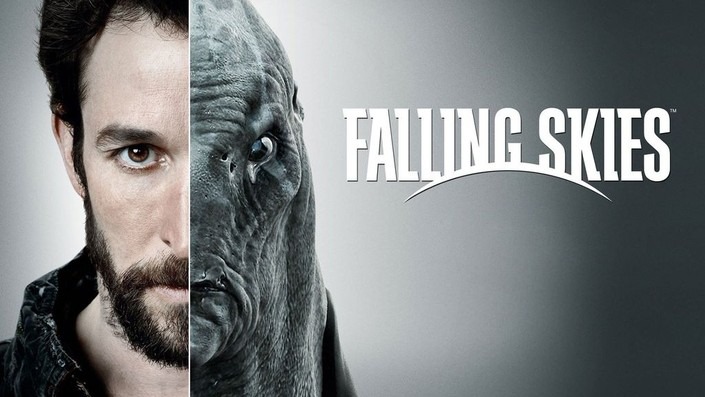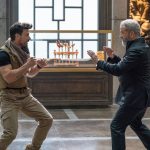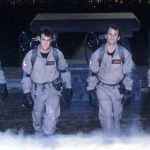Falling Skies (2011)

“Falling Skies,” a science fiction television series that premiered in 2011, stands as a significant entry into the genre of post-apocalyptic drama. Created by Robert Rodat and produced by Steven Spielberg, the series delves into the aftermath of an alien invasion that has decimated Earth’s population. Known for its compelling storytelling, character development, and its depiction of human resilience in the face of overwhelming odds, “Falling Skies” has captivated audiences with its blend of science fiction, drama, and action.
The narrative of “Falling Skies” unfolds in a world where Earth has been devastated by a violent alien invasion. The extraterrestrial beings, known as the Skitters and their overlords, the Mechs, have not only obliterated major cities but also captured and enslaved many survivors, including children who are turned into “harnessed” soldiers. Against this bleak backdrop, the series follows a group of survivors led by former history professor Tom Mason (Noah Wyle), who becomes a key figure in the resistance against the alien invaders.
Tom Mason, who has lost his wife to the invasion, is a central figure in the fight for humanity’s survival. As the leader of the 2nd Massachusetts Militia Regiment, he works tirelessly to protect the survivors, secure resources, and strategize against the alien forces. The group is comprised of diverse characters, each with their own motivations and personal stakes in the fight against the invaders.
The series begins with the aftermath of the initial invasion and progresses through the resistance’s efforts to reclaim their world. The narrative explores themes of leadership, family, and survival as the characters navigate both the external threats posed by the aliens and the internal struggles of maintaining hope and unity. The show’s plot is marked by intense action sequences, moments of emotional depth, and a gradual unveiling of the aliens’ motives and weaknesses.
The strength of “Falling Skies” lies not only in its gripping plot but also in its well-developed characters and strong performances.
Tom Mason (Noah Wyle): Noah Wyle’s portrayal of Tom Mason is central to the series. As a former history professor thrust into the role of a leader, Wyle brings depth and authenticity to the character. Tom Mason’s evolution from a civilian to a military leader is depicted with nuance, showcasing his struggles, sacrifices, and growth. Wyle’s performance is marked by a blend of determination, vulnerability, and moral complexity, making Tom a relatable and compelling protagonist.
Anne Glass (Moon Bloodgood): Moon Bloodgood plays Anne Glass, a doctor who becomes Tom’s partner both in the fight against the aliens and in a personal relationship. Bloodgood’s portrayal adds a layer of emotional depth to the series, as Anne’s character grapples with the challenges of caregiving and the pressures of wartime. Her chemistry with Wyle enhances the show’s emotional impact and adds a personal dimension to the narrative.
Hal Mason (Drew Roy): Drew Roy portrays Hal Mason, Tom’s teenage son, who becomes a key figure in the resistance. Hal’s journey from a scared teenager to a capable fighter is a significant aspect of the series. Roy’s performance captures Hal’s growth, determination, and the complexities of his relationship with his father. His character arc explores themes of maturity and sacrifice, reflecting the broader struggles faced by the survivors.
Pope (Colin Cunningham): Colin Cunningham’s portrayal of Pope, a former convict turned resistance fighter, adds a gritty and unpredictable element to the series. Pope’s character is marked by his rough demeanor and moral ambiguity, which creates tension and conflict within the group. Cunningham’s performance brings a sense of raw intensity and complexity to the character, contributing to the show’s dynamic ensemble.
The direction of “Falling Skies,” under the guidance of various directors including Steven Spielberg, is characterized by its blend of suspense, action, and drama. The show’s visual style combines practical effects with CGI to create a believable post-apocalyptic world and menacing alien creatures. The design of the Skitters and Mechs is notable for its originality and effectiveness in conveying the sense of threat and alienness.
The series employs a range of cinematographic techniques to enhance the tension and atmosphere. The use of dim lighting, desolate landscapes, and close-up shots of the characters’ expressions contributes to the show’s immersive quality. The action sequences are well-choreographed, and the practical effects of the alien invasion are effectively integrated into the narrative.

“Falling Skies” explores several significant themes through its narrative and characters:
Survival and Resilience: At its core, the series is about survival in the face of overwhelming odds. The characters’ struggle to maintain their humanity and find hope amidst destruction is a central theme. The show examines the resilience of the human spirit and the lengths to which individuals will go to protect their loved ones and fight for their survival.
Leadership and Sacrifice: The theme of leadership is prominent, with Tom Mason’s role as a leader being a focal point of the series. The show explores the responsibilities and burdens of leadership, as well as the personal sacrifices that come with it. Characters are often faced with difficult choices that test their resolve and morals.
Family and Unity: The series places a strong emphasis on the importance of family and community. The relationships between characters, particularly within the Mason family, highlight the emotional and moral complexities of maintaining bonds and unity in a time of crisis. The dynamic within the resistance group also underscores the need for cooperation and solidarity.
Resistance and Rebellion: The fight against the alien invaders symbolizes broader themes of resistance and rebellion. The series explores the struggle against oppression and the fight for freedom and autonomy. The resistance’s efforts to reclaim their world reflect the broader human desire for self-determination and justice.

“Falling Skies” was released during a period when post-apocalyptic and alien invasion narratives were popular in mainstream media. The series contributes to this genre by blending traditional science fiction elements with character-driven drama. The show’s exploration of themes related to survival and resistance resonates with contemporary concerns about global conflict and resilience.
The series also reflects the influence of Steven Spielberg’s previous work, particularly his penchant for blending human drama with science fiction elements. The show’s approach to storytelling, with its focus on character development and emotional depth, aligns with Spielberg’s broader cinematic style.

“Falling Skies” (2011) is a compelling and thought-provoking science fiction series that combines elements of post-apocalyptic drama with action and suspense. Created by Robert Rodat and produced by Steven Spielberg, the show stands out for its strong character development, engaging plot, and exploration of themes such as survival, leadership, and family. With its dynamic performances, effective direction, and visual style, “Falling Skies” offers a memorable and impactful viewing experience. The series not only entertains but also provides a nuanced examination of human resilience and the fight against overwhelming odds. As a notable entry in the science fiction genre, “Falling Skies” remains a significant contribution to the landscape of television storytelling.











